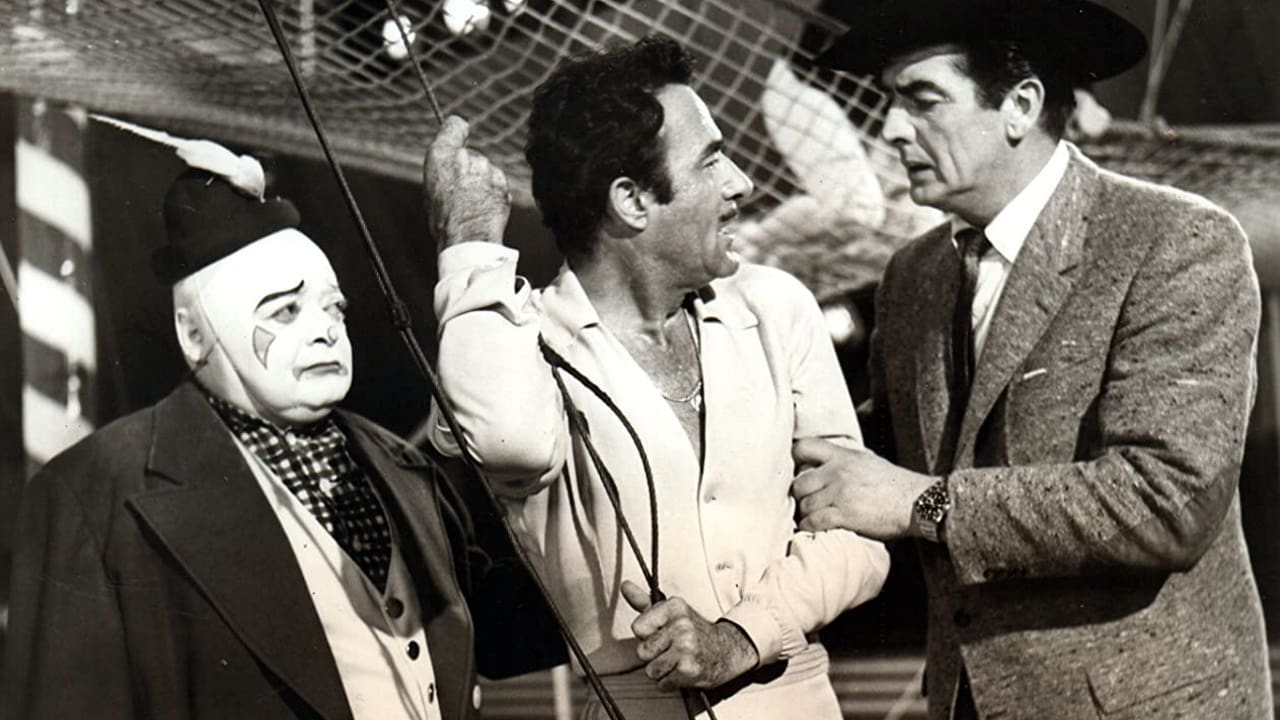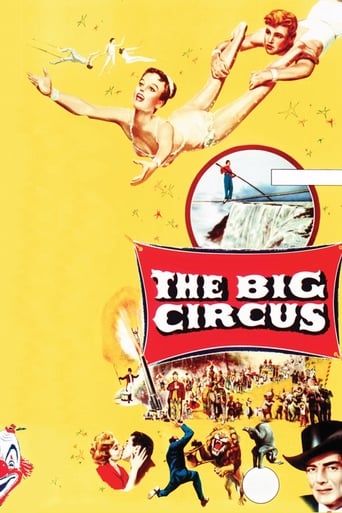



Good films always raise compelling questions, whether the format is fiction or documentary fact.
View MoreNot sure how, but this is easily one of the best movies all summer. Multiple levels of funny, never takes itself seriously, super colorful, and creative.
View MoreThe story-telling is good with flashbacks.The film is both funny and heartbreaking. You smile in a scene and get a soulcrushing revelation in the next.
View MoreA clunky actioner with a handful of cool moments.
After losing his business partner, "Whirling Circus" manager Victor Mature (as Henry "Hank" Whirling) must borrow a half million dollars so that the show can go on - a US tour. He gets the money, but must accept two new staff members to insure a profitable return on the loan. Joining the troupe are full-figured publicist Rhonda Fleming (as Helen Harrison) and penny-pinching banker Red Buttons (as Randy Sherman). Having a female press agent irks Mr. Mature, but you wouldn't want to bet against a kiss before the closing credits. This being a circus movie, you might suppose a lion could be let loose, at some point. Also, figure on one or more mysterious accidents, which might actually be murder...This closely follows the circus picture pattern, especially Cecil B. DeMille's hit "The Greatest Show on Earth" (1952). "The Big Circus" has a smaller budget, but producer Irwin Allen makes less look bigger than expected. It's colorful and bland, but must have been a cool way to spend time in the summer of 1959. The cast member shining is former "silent" screen star Gilbert Roland (as Zach Colino), looking incredibly fit as the circus' main attraction. "Ozzie and Harriet" son David Nelson (as Tommy Gordon) is also fit, as a younger model. Bing Crosby's second wife Kathryn Grant (as Jeannie Whirling) is likewise sexy in tights. Looking sneaky and clownish are veterans Vincent Price and Peter Lorre.***** The Big Circus (1959-07-05) Joseph M. Newman ~ Victor Mature, Gilbert Roland, Red Buttons, Rhonda Fleming
View MoreSpecial Effects Master Irwin Allen makes this movie look good with the camera and Technicolor available in 1959. It is entertaining, but no masterpiece to be sure.For one thing, Victor Mature is kind of wasted here. It is not Mature's fault but has to do with the script as he only gets the bare minimum of chances to act as he has very little dialog to work with. Rhonda Fleming and the women in the cast are OK but in spite of a couple of romantic angles put into the script, do not really shine and that has to do some with the script too.Vincent Price, Peter Lorre and Red Buttons are clearly support but I think an opportunity was missed by central casting. It is obvious that Lorre is not feeling well by the way he acts in the film. It might have been more effective to have cast Lorre in a different role as he does not have the energy to make a good clown. Buttons actually doubles for him in a clown sequence. If Buttons had been cast as the clown, the film could have come out better.It is still a decent film in spite of this and Price is really just the RingMaster of the Circus it seems. With the recent successful Walenda tight wire walk across Niagra Falls, this one seems a bit obvious as you can tell a back projection screen is employed by Allen. Still it does mention someone had done it 100 years earlier which makes the recent Wallenda walk more significant.
View MoreThe "big circus" of the title is in financial difficulties, so its owner, Henry Whirling, approaches his bank for a loan. The bank president Jonathan Nelson agrees, subject to the condition that Randy Sherman, a bank official, will join the circus on tour to manage the financial side of the business. Whirling reluctantly agrees to this condition, but his working relationship with Sherman is a difficult one. Sherman has no interest in circuses, and even advised the bank not to grant the loan, advice which was overruled by Nelson. Whirling (clearly no supporter of the Equal Rights Amendment) is particularly upset by Sherman's decision to hire a female press officer.The film tells the story of the circus's subsequent event-filled tour across America. There are a number of interlinked subplots. One is concerned with the efforts of a rival proprietor to sabotage Whirling's circus by infiltrating a saboteur into his company. (The identity of the saboteur remains hidden until the final scenes). The wicked rival is named Borman, possibly a reference to Nazi leader Martin Bormann. Another subplot tells of how Sherman's attitude changes as he comes to respect the circus as a way of life as well as a business, and how he even falls in love with Whirling's attractive younger sister Jeannie (who has ambitions to become an acrobat herself). Whirling, in the meantime, finds himself falling for Helen, the press officer. Another plot line concerns Zach Colino, Whirling's star acrobat, and his efforts to come to terms with the death of his wife, who dies in a train crash caused by the saboteur.Although Whirling is supposedly the hero of the story, he does not come across as very sympathetic. Part of the blame for this lies with Victor Mature, never the most energetic of actors, who does not try very hard to make his character likable but part must also lie with the scriptwriter. It is a common plot device for characters who will later fall in love to start off by quarrelling or disliking one another, but Henry's initial churlishness towards Helen simply leaves the audience with the indelible impression that he is a churl. The scene in which he goads the recently-bereaved Zach into attempting a dangerous high-wire crossing of Niagara Falls by accusing him of cowardice seemed very cruel, even after Henry gave the implausible explanation that he was doing Zach a kindness by helping him to recover his self-respect. To invert the well-known proverb, you've got to be kind to be cruel.The film implies, incidentally, that Zach's feat made him the first man to cross Niagara on a tightrope since Charles Blondin. Whereas Blondin was indeed the first man to perform this feat (in 1859), he was soon followed by numerous imitators, and a crossing of Niagara became a standard exploit for Victorian acrobats.Apart from Gilbert Roland as Zach, none of the other characters stood out. I guessed- wrongly- that Vincent Price's ringmaster would turn out to be the saboteur, simply because I could not credit that the producers had hired such a big-name star to stand about with so little to do and with no major role to play. Neither of the female leads, Rhonda Fleming as Helen nor Kathryn Grant as Jeannie, made much impression. This was (at the age of 26) Grant's last feature film before she left the cinema to marry Bing Crosby, and, although she was undoubtedly attractive, it could not be said, on the basis of this performance, that she thereby deprived the cinema of a major talent.Another reviewer complains that "the circus movie genre is regrettably slim". The circus, in fact, with its colour and pageantry, had a certain attraction to film-makers in the days when the cinema needed to rely upon visual spectacle in order to compete with television, but the reason that relatively few circus-themed movies were made is that circus stories (both in the cinema and other media) rely upon a few well-worn plot conventions which have become clichés. Most of those clichés are trotted out here- the escaping lion, the fire, the train crash, the acrobat in danger of falling to his death, the clown whose smiling mask conceals a guilty secret (in this case alcoholism) and, above all, the stoical the-show-must-go-on philosophy, taken in this film to absurd lengths. (The death of one's wife is not, it would appear, regarded among the circus fraternity as a good excuse for missing a performance). There are a few exciting scenes- mostly involving Zach- but this is, for the most part, a rather dull, clichéd melodrama. 5/10
View MoreA typical Irwin Allen spectacle, this has its moments--the daring publicity stunt involving a tightrope walker crossing Niagara Falls is genuinely exciting--but for the most part is just too prosaic and small-minded to be the blockbuster it was undoubtedly intended to be. It would have helped if Victor Mature's shifty circus owner were either less of a jerk or an out-and-out villain, and certainly if Vincent Price (who seems to have been cast as the ringmaster simply because of his moustache) had been given more to do than to stand around in unbecoming leisure outfits. On the other hand, Peter Lorre (whose presence as a clown alienates both Lorre fans who view it as the ultimate insult to that ill-used actor's dignity, and clownophobes who see it as a confirmation of their worst fears) gives the film a heart and humor it wouldn't have had otherwise.
View More